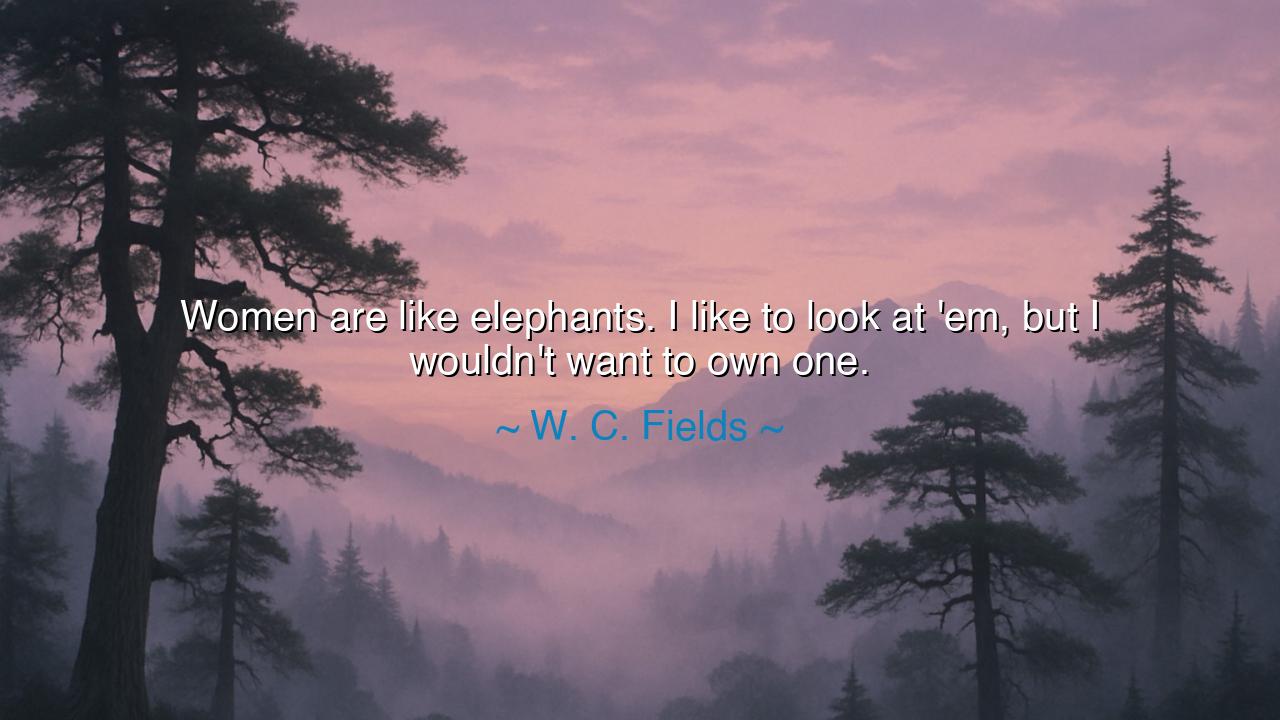
Women are like elephants. I like to look at 'em, but I wouldn't






W. C. Fields, the master of dry wit and biting jest, once uttered: “Women are like elephants. I like to look at ’em, but I wouldn’t want to own one.” Though framed in humor, this saying carries within it the paradox of admiration mingled with fear. He likens women to elephants, beings majestic and beautiful to behold, but powerful, demanding, and not to be bound by ownership. Beneath the cloak of laughter lies an acknowledgment of awe—an admission that women, like elephants, are creatures of strength and mystery, too great to be possessed without peril.
The ancients knew well that jest often hides deeper truths. The fool in the king’s court spoke with laughter, yet beneath his quips lay wisdom sharper than swords. So here, Fields jested about the peril of ownership in relationships, mocking the age-old desire of men to control women as property. In truth, the saying ridicules not women, but the folly of possession itself. To admire from afar is safe; to seek mastery is to invite struggle, for power cannot be tamed by chains of pride.
History, too, provides a mirror. Consider the story of Samson and Delilah. Samson, mighty among men, believed his strength made him master, yet his heart was undone when he tried to command what could not be owned—love, loyalty, and the spirit of a woman. Like the elephant, Delilah was not his possession, but her own being, and in forgetting this, Samson fell. Thus Fields’ humor, when stripped of its surface, echoes an eternal lesson: that those who try to “own” another soul invite their own undoing.
There is also reverence hidden in the comparison. The elephant is wise, long-lived, and noble, a creature of memory and majesty. To liken women to elephants is to unwittingly bestow honor, even while jesting. Women, like elephants, cannot be reduced to ornament or property; they are forces of nature, commanding respect whether from near or far. Fields, through comedy, acknowledges this truth, even if his words appear flippant.
Let this saying be remembered as more than humor: the folly of trying to possess what should only be honored. For the ancients teach us that love thrives in freedom, not in chains, and admiration without domination becomes the purest form of reverence. Thus, in his jest, Fields handed down a truth deeper than he perhaps intended—that women, like elephants, should be beheld with wonder, not shackled with ownership.






GBTruong Gia Bao
W. C. Fields’ quote presents an example of humor that relies on objectifying women. Is it fair to simply dismiss such statements as jokes from a different time, or should we take a closer look at the impact such humor continues to have? In what ways can we challenge and move beyond these outdated, harmful attitudes in today’s discourse on gender equality?
HPDuc Huy Pham
While W. C. Fields' quote may have been intended as a joke, it presents an outdated and troubling perspective on women. Should we accept humor that reflects objectification or belittles women? How do we distinguish between humor that critiques societal norms and humor that reinforces negative stereotypes about women and their roles in society?
NNNHU NGOC
W. C. Fields’ quote is clearly meant to be humorous, but it raises a concerning point about the objectification of women. How often do we hear jokes like this, and should they be dismissed simply because they are intended to be funny? Can humor that objectifies women ever be truly innocent, or does it perpetuate harmful ideas about gender dynamics?
LAPham Lan Anh
This quote by W. C. Fields seems to trivialize women by comparing them to animals and implying they are something to be owned. While it might be seen as an old-fashioned attempt at humor, should we be more critical of such views, even when presented as jokes? How much damage do comments like these do in shaping our perception of gender roles and relationships?
TTNguyen Thanh Thao
W. C. Fields' quote is undoubtedly meant as humor, but it strikes me as problematic. Comparing women to elephants and implying ownership seems both demeaning and outdated. Is it fair to use humor as an excuse to perpetuate harmful stereotypes? How does this quote reflect the societal views of women during Fields' time, and how should we interpret such statements today in a more progressive context?